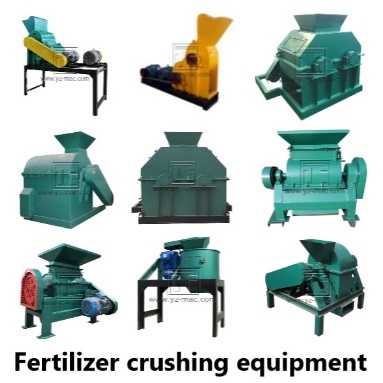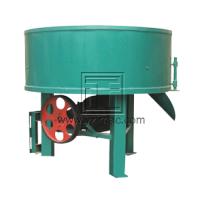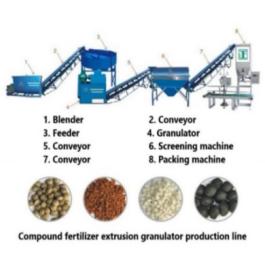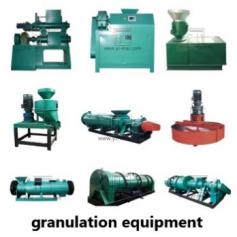Fertilizer crusher
A fertilizer crusher is a specialized machine designed to break down solid fertilizers into smaller particles, facilitating the production of high-quality fertilizers. This equipment plays a crucial role in the fertilizer manufacturing process by ensuring the uniformity and consistency of fertilizer materials.
Benefits of a Fertilizer Crusher:
Particle Size Control: A fertilizer crusher allows for precise control over the size and uniformity of fertilizer particles. By breaking down large fertilizer materials into smaller particles, it ensures that the resulting fertilizer blend is consistent, promoting efficient nutrient release and absorption by plants.
Increased Solubility: Crushing solid fertilizers with a crusher enhances their solubility. The smaller particle size obtained through crushing allows for faster and more efficient dissolution of the fertilizer when applied to the soil, ensuring improved nutrient availability for plants.
Enhanced Nutrient Release: The crushing process of fertilizers promotes the release of nutrients. By reducing the particle size, a fertilizer crusher exposes a larger surface area of the materials, facilitating microbial activity and enzymatic reactions that aid in nutrient mineralization and release.
Improved Blending Efficiency: A fertilizer crusher helps achieve uniformity in fertilizer blends. By breaking down different fertilizer materials into smaller particles, it allows for easier and more efficient blending, ensuring an even distribution of nutrients throughout the fertilizer mixture.
Working Principle of a Fertilizer Crusher:
A fertilizer crusher generally operates through a crushing mechanism that involves the use of sharp blades or hammers to pulverize solid fertilizer materials. The materials are fed into the crusher, and the rotating blades or hammers rapidly crush them into smaller particles. The crushed particles are then discharged through a screen or grid, which controls the desired particle size.
Applications of Fertilizer Crushers:
Fertilizer Production Plants: Fertilizer crushers are essential equipment in fertilizer production plants. They are used to process various solid fertilizers, including ammonium nitrate, urea, diammonium phosphate (DAP), and potassium chloride. The crushed materials can be further processed or blended to produce different fertilizer formulations.
Organic Fertilizer Production: In the production of organic fertilizers, a crusher is utilized to break down organic materials such as animal manure, crop residues, and compost. By crushing these materials, the crusher promotes the decomposition and homogenization of organic matter, facilitating the production of high-quality organic fertilizers.
Fertilizer Blending Facilities: Fertilizer crushers play a crucial role in blending facilities, where different fertilizers and additives are combined to create customized fertilizer blends. The crushers ensure that the materials are properly crushed and mixed, resulting in uniform and well-blended fertilizer products.
Agricultural Applications: Fertilizer crushers are also used in agricultural applications where solid fertilizers need to be processed or modified. These crushers are employed to crush bulk fertilizers into smaller particles that are more suitable for application through seeding equipment, spreaders, or irrigation systems.
A fertilizer crusher is an essential machine in the production of high-quality fertilizers. It enables precise control over particle size, enhances solubility and nutrient release, and improves the efficiency of blending operations. Whether in fertilizer production plants, organic fertilizer production, blending facilities, or agricultural applications, a fertilizer crusher ensures the uniformity and effectiveness of fertilizers. By selecting the appropriate crusher and optimizing the crushing process, fertilizer manufacturers and farmers can achieve optimal results in fertilizer production and application, contributing to improved crop yields and sustainable agricultural practices.







